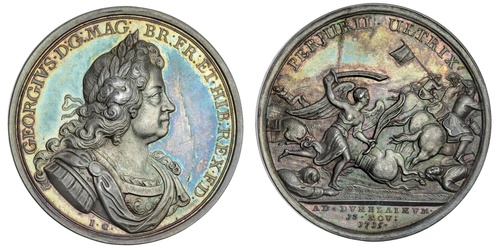
Auction: 22007 - British and World Coins and Commemorative Medals Autumn Auction
Lot: 790
Battle of Sheriffmuir, AR Medal, 1715, by J. Croker, GEORGIVS • D : G : MAG : BR : FR : ET • HIB : REX • F : D •, laureate, armoured and draped bust right, rev. PERJURII • ULTRIX •, Victory wielding a sword, hotly pursues fleeing cavalry, AD • DVNBLAINVM • 13 • NOV : 1715 • in exergue in three lines, plain edge, 46mm, 36.19g (Eimer 475; MI ii, 434/33; Woolf 31:1; Harding 53 this medal), struck from a broken die, nevertheless with the most striking and vibrant toning, brilliant surfaces beneath, a most attractive example in hand, as struck and rare in this condition
Early in 1715 the Jacobite Party planned a new attempt at the invasion of Britain based on simultaneous attacks in the West Country and Scotland where support for the Stuart cause was thought to be strong. The British government was not caught unawares. James' secretary of State, Bolingbroke, shared a mistress, a former nun, with Abbe Dubois, later a cardinal and First Minister of France. Information about the proposed invasion of Britain given by Bolingbroke to the lady was fed to the Abbe who sold it to the British Ambassador to Paris who, in turn, informed the British Government.
An attempt to take Plymouth, Bath and Bristol, led by the Duke of Ormonde, proved to be both premature and unsuccessful. Meanwhile the Earl of Mar had assembled an army of 10,000 in his attempt to re-establish the House of Stuart of Scotland. He succeeded in taking Perth and Inverness but his force was met at Sheriffmuir near Dunblain by a force some 3,500 strong led by the Duke of Argyll. The battle was inconclusive but the Stuart army, though superior in numbers, melted away the following day. Another army led by General Mackintosh, penetrated as far south as Preston but was defeated, coincidentally on the same day. James himself arrived in Scotland in December but the Duke of Argyll had then had enough time to build up a superior force and the Jacobite's retreated to Montrose. James sailed back to the Papal city of Avignon, having been barred from France by the Treaty of Utrecht. The reverse legend on this medal refers to the Earl of Mar and some of his commanders who had sworn oaths of allegiance but had given up when facing an inferior force.
Subject to 20% VAT on Buyer’s Premium. For more information please view Terms and Conditions for Buyers.
Sold for
£2,000
Starting price
£1200




